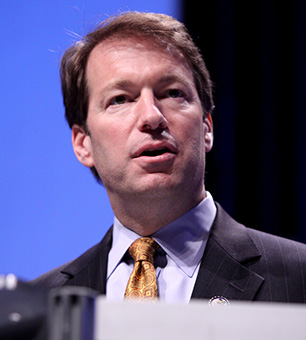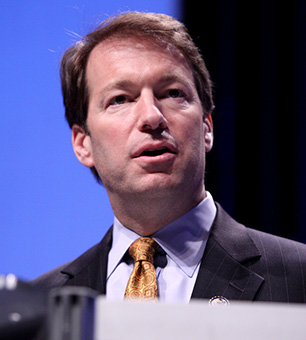 Chief Deputy Whip Peter Roskam, US Representative for Illinois, is one of the backers of the “Protect Academic Freedom Act.” (Photo: Gage Skidmore / Flickr)Professors in cultures everywhere should challenge, explore, investigate and critique. Boycotts have an honorable history as a vehicle to promote citizen participation. Academics are rightly concerned that bills seeking to punish academic organizations boycotting Israeli institutions will impose a political test on faculty members.
Chief Deputy Whip Peter Roskam, US Representative for Illinois, is one of the backers of the “Protect Academic Freedom Act.” (Photo: Gage Skidmore / Flickr)Professors in cultures everywhere should challenge, explore, investigate and critique. Boycotts have an honorable history as a vehicle to promote citizen participation. Academics are rightly concerned that bills seeking to punish academic organizations boycotting Israeli institutions will impose a political test on faculty members.
When average citizens attempt to change the policies of governments and corporations, it’s a David versus Goliath battle. And the boycott is one of the few nonviolent vehicles that history has proven effective at coming anywhere close to leveling the playing field.
In fact, the United States itself is a product of a colonial boycott, called for by the First Continental Congress on Oct. 20, 1774, to persuade British lawmakers and influence public opinion – thus avoiding outright war. The Boston Tea Party, which we revere today as a highly patriotic act, was a more radical remedy in the same spirit. Other prominent examples of boycotts lauded by history include Mahatma Gandhi’s fight against British colonialists in India, the Montgomery bus protest of the 1960s civil rights movement, and the global boycott against companies that did business with the apartheid South African regime.
“Use of the political boycott as a means of exerting grassroots power over issues of public concern is as American as apple pie,” observe the Center for Constitutional Rights and the National Lawyers Guild.
Yet legislators in the House of Representatives and a growing number of state assemblies are attempting to censor academics and others who use the tool to protest Israeli human rights violations in the Occupied Palestinian Territories.
The wave of bills was introduced to punish the 5,000 members of the American Studies Association (ASA) – the nation’s largest society devoted to the study of US culture and history – for their vote to reject collaborations with Israeli institutions until that state ceases its violations of human rights and international law – including the ongoing illegal expansion of Jewish-only settlements.
The first of the bills was introduced in New York, with the state Senate passing a measure January 28 that would prohibit public universities from using any taxpayer money to reimburse faculty members for expenses such as dues, registration fees and travel when participating in activities sponsored by groups that support boycotts of Israeli actions. The penalty for infraction would be loss of all state funding – a heavy toll sure to have a significant chilling effect. The state Assembly opened debate on the same bill but, after a flood of criticism, revised it to threaten only the loss of the money spent on the banned activities. The modified bill is now under consideration. Since then, a bill similar to the New York Senate version has been introduced in both legislative houses in Maryland, and another is headed for the Illinois Legislature; measures without the punitive provisions are pending in Florida and Pennsylvania. On February 6, 2014, the movement to squelch the right to academic dissent went national, when the deceptively named “Protect Academic Freedom Act” was introduced to the US House of Representatives by Chief Deputy Whip Peter Roskam, a Republican from Illinois, and Rep. Dan Lipinski, an Illinois Democrat. As with many such bills, the name implies the exact opposite of the actual impact if this measure were to pass, nationally or in the states.
The significance of these proposals may seem small upon first reading; after all, why can’t professors pay for their own membership dues, for instance? Melani McAlister, an ASA member and associate professor of American studies and international affairs at George Washington University, responds in The Baltimore Sun: “So if, for example, a professor wanted to present her paper at an ASA conference, whether it be an analysis of 19th century American literature or a study of the African-American civil rights movement, she would have to find a way to pay for the fees and travel out of her own pocket. Yet a scholar in the office next door who presents a paper at any other conference would receive the usual research support to do so. The point will not be lost on scholars: If they are to be penalized just for being members of an organization whose policies legislators do not like, how much more will they feel under threat if they want to actually discuss the boycott, or even to advocate for it?”
The 45,000-member American Association for University Professors, which opposed the ASA boycott when it was adopted in December, was quick to recognize the broader danger in these bills. It is “the right of academic (groups) to not cooperate with other academic institutions with which they disagree. Academic freedom is meaningless if it does not protect those who support unpopular positions, including the advocacy of academic boycotts.”
Echoing these concerns, The New York Times editorial board weighed in February 3, writing, “Academics are rightly concerned that it will impose a political test on faculty members seeking university support for research meetings and travel.”
Even several major Jewish organizations, including the Anti-Defamation League and the American Jewish Committee, have publicly distanced themselves from the bills for this reason.
Whether these measures are even constitutional remains an open question. Delegate Ben Kramer, one of 51 sponsors of the Maryland bill, claims the state has the legal right to prevent bodies it funds from violating a “declaration of cooperation” it signed with the government of Israel to cooperate in the areas of trade, agriculture and academic and economic development – and thus has the backing of the state’s attorney general’s office. However, opponents such as the US Campaign to End the Israeli Occupation respond that the legality of any bilateral agreements with Israel is questionable, in light of the country’s lack of compliance with Maryland’s non-discrimination laws. The US State Department has consistently found in its annual human rights reports that Israel discriminates on the basis of race, religion and ethnicity. Likewise, as the State Department travel warning demonstrates, Israel’s discriminatory policies extend to US citizens, particularly those of Arab or Muslim heritage.
The role of professors in cultures everywhere should be to challenge, explore, investigate and critique. Boycotts have long been a vehicle used by academics and many others to promote citizen participation and make their feelings known. As the Center for Constitutional Rights wrote in its statement to the House, “The participation of numerous academic organizations in the South African boycott would have led to the denial of funds … had there been bills such as these directed at silencing opposition to the apartheid regime. It would have been an unacceptable outcome then, and it is an unacceptable outcome now.”
Join us in defending the truth before it’s too late
The future of independent journalism is uncertain, and the consequences of losing it are too grave to ignore. To ensure Truthout remains safe, strong, and free, we need to raise $24,000 by the end of today. Every dollar raised goes directly toward the costs of producing news you can trust.
Please give what you can — because by supporting us with a tax-deductible donation, you’re not just preserving a source of news, you’re helping to safeguard what’s left of our democracy.
